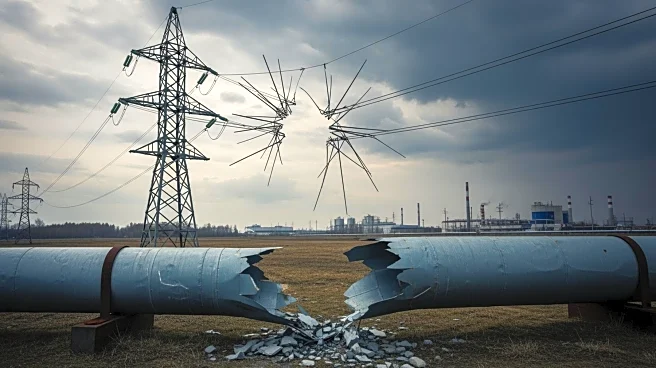What's Happening?
Ukraine has faced significant power outages following a massive Russian attack on its power grid, described as the most extensive since the start of the invasion. The strikes targeted key regions including Kyiv, Dnipropetrovsk, and Poltava, leading to
emergency power cuts lasting up to 16 hours. In response, Ukraine launched drone counterattacks targeting Russian energy infrastructure, resulting in power outages in Voronezh, affecting around 20,000 residents. Ukrainian Energy Minister Svitlana Vasylivna Hrynchuk announced that emergency power cuts would continue until the power system stabilizes.
Why It's Important?
The ongoing conflict between Ukraine and Russia continues to escalate, with energy infrastructure becoming a focal point of military strategy. The attacks on Ukraine's power grid have significant implications for civilian life, potentially disrupting essential services and increasing humanitarian challenges. Ukraine's counterattacks on Russian energy infrastructure highlight the reciprocal nature of the conflict, potentially leading to further retaliatory measures. The situation underscores the vulnerability of energy systems in wartime and raises concerns about nuclear safety, as Russian strikes have also targeted nuclear plants.
What's Next?
Ukraine's Foreign Minister Andrii Sybiha has called for an urgent meeting of the IAEA Board of Governors to address the risks posed by Russian attacks on nuclear facilities. The international community may increase diplomatic efforts to mitigate the conflict's impact on nuclear safety. Meanwhile, both countries are likely to continue targeting each other's energy infrastructure, potentially leading to further disruptions and international condemnation. The situation remains fluid, with potential for escalation or diplomatic intervention.
Beyond the Headlines
The targeting of energy infrastructure in the Ukraine-Russia conflict highlights broader ethical and legal concerns regarding warfare tactics that impact civilian populations. The attacks raise questions about the protection of critical infrastructure under international law and the responsibilities of warring parties to minimize civilian harm. Long-term, the conflict may drive changes in international policies regarding the security of energy systems and nuclear facilities in conflict zones.















